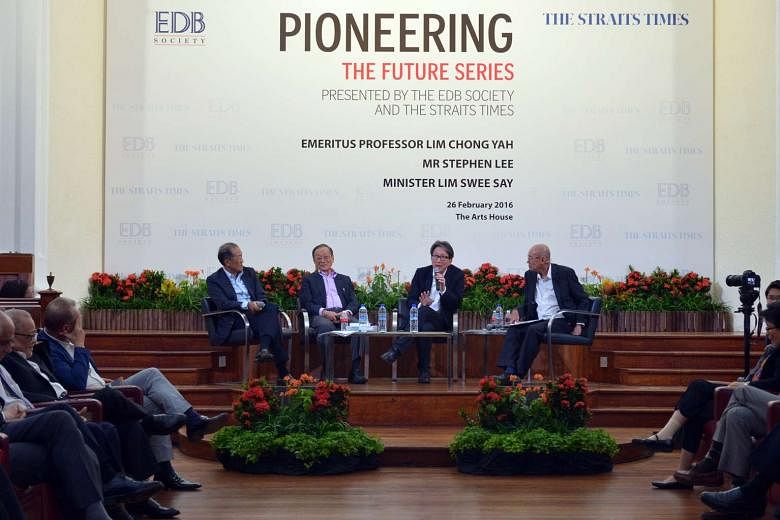SINGAPORE - Singapore's "golden era" of galloping economic growth in the past 50 years is over, said Manpower Minister Lim Swee Say on Friday (Feb 26) at a forum on tripartism, or the uniquely harmonious ties among the Government, employers and workers here.
The other two stalwarts of tripartism there were economist Lim Chong Yah, founding chairman of the National Wages Council and Singapore Airlines chairman Stephen Lee, who was president of the Singapore National Employers Federation for 26 years.
It was not all doom and gloom, though, he stressed, because the Government, businesses and the labour movement here were in the midst of identifying the skills and jobs of the future in 25 sectors of industry here, so that they could design better careers for most.
He also stressed that rapid and disruptive improvements in technology and higher automation would not necessarily lead to loss of jobs, but create even more jobs to complement newfangled machines. The aim, he added, was to shape every Singaporean as "precious human capital".
Mr Lim warned that if everyone kept pursuing the sort of growth that took per capita income here from US$516 in 1965 to US$56,742 in 2014, "even if the operation is successful, the patient may be dead."
As a country's GDP is made up of two parts - the growth in the national pool of workers and the rate of productivity - he pointed out that the size of the Singaporean workforce would also decline from now on from an ageing population and ever-fewer births.
So the way to go was to boost productivity, he said, in a deep and lively discussion moderated by The Straits Times' editor-at-large Han Fook Kwang.
Mr Lim commended, in particular, the hospitality industry here, which he said would be able to cope with a likely 20 per cent increase in hotel rooms here in 2020 without employing more workers.
In the ensuing question-and-answer session, audience member Albert Teo, a hotel veteran, said Mr Lim "had been pushing us like hell" to raise productivity such that only 0.62 of a person was needed to clean a hotel room, compared to three persons per room in China.
After likening the productivity to shifting a boulder, Mr Lee said that SIA was also working with airplane builders to boost productivity by, say, servicing planes directly on the tarmac, to cut down on their downtime.
To Prof Lim's plea that Singapore continue welcoming highly skilled foreign workers, Mr Lim said: "Can no longer pursue a liberal foreign worker policy." As it was, he added, the Government had shrunk the inflow of foreign workers from a high of 100,000 a year to 24,000 in 2014 and 22,000 last year (2015).
Today, two-thirds of all workers here are Singaporean and the rest are foreigners, and Mr Lim said the Government will keep it like so in future.
In all this, Mr Lim noted, Singapore's "secret weapon" was tripartism because thanks to it, all stakeholders in the workforce here cooperated well unlike those in other countries, who either never talked to one another or were quarrelling among themselves all the time.
Prof Lim noted, however, that in the 1970s, there were lots of differences in views and even table-thumping during tripartite negotiations "within four walls", but they always kept all discussions confidential and agreed to a united stand in the end.
Labour movement chief Chan Chun Sing underscored Singapore's dilemma for the next 50 years, that is, it was a city as well as a state.
So, while slower growth would not be a problem if it were competing with other countries, it was a huge setback as Singapore's real competitors were other dynamic global cities which did not lack talent and other resources.
Mr Chan added that to ensure the Republic was not relegated "to the dustbin of history" like most other city-states, employers and employees here had to change "the mindset and method" of working. For example, he said, one should from the outset design a new building such that from the outset, its security guards need not patrol it aimlessly.
He then said: "We started with much less 50 years ago and we have much more at our disposal today."


